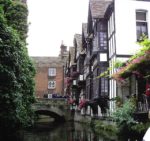In the light of recent political events, immigration is a subject that has been very much on my mind lately. While not wishing to get on any kind of political soap box here, as a professional genealogist I am very aware that many, if not most, of us are the descendants of immigrants, without, perhaps, even realising it.

Jewish refugees – Liverpool 1882
Some of us, in fact, owe our very existence to those brave souls who left their homes behind to escape war, discrimination or famine, and make a new life in this strange, rather wet and cold new land, having to face the problems of finding work, fitting in, and learning a new language, not to mention being looked on with suspicion by the local natives. Most of them would never see their homeland, or those they left behind, again.
My own ancestry includes several Irish immigrants, most likely escaping the potato famine that swept Ireland in the 1840s and 50s and caused thousands of families to die of starvation. I also have an ancestor who came from the United States of America, who himself was descended from early 17th century settlers in Massachussets, originally coming from Lincolnshire in the UK. My best friend has ancestors who came from Prussia in the early 19th century, possibly political or religious refugees.
Britain’s culture has evolved and been created by immigration from its very dawn of existence right up to the present day. Some of the things we think of as being inherently British were in fact introduced by immigrants. Fish and chips, for example. You can’t get more British than that can you? In fact, fried fish was introduced by Spanish Jews in the 19th century, and first sold with chips in the first fish and chip shop in London, by Joseph Malin, a Jewish immigrant from Eastern Europe.
Wherever you look, much of our British culture has been introduced from outside the UK.

1963 Mini
Tea, of course, was introduced from China, Christmas trees from Germany, curry from India. The Mini – probably the most iconically British car – was designed by a Greek assylum seeker. Our own Royal Family of course have a heady mix of European blood.
Here is a brief chronology of immigration into the UK, starting with the Romans:
- 1st Century BC: Romans invade Britain, settling and creating many of our place names.
- 5th to 7th Centuries: Anglo-Saxon invasion sees migration of Germanic peoples into Britain.
- 8th to 11th Centuries: Viking invasions bring people from Scandinavia who settled in much of East Anglia.
- 11th Century: The Norman Conquest of 1066 brought much of the French aristocracy into Britain, and with them the beginnings of many of our surnames.
- 11th Century onwards: Jews, often fleeing persecution, settled in the East End of London.
- 17th Century: Huguenots – French protestants fleeing persecution settled in North and East England, the East End of London and elsewhere.
- 17th to 21st Centuries: Indians seeking work, many settling in Port towns and London
- 18th to 21st Centuries: Africans, originally brought in slave ships. Later on fleeing from war, and in recent years many have come seeking work.
- 18th to 19th Centuries: Germans, often political or religious refugees, settled in the North of England and elsewhere.
- 19th century: Russian Jews fleeing persecution, setted in East London.
- 19th century: Irish immigrants fleeing from famine. In fact, the irish have steadily arrived in Great Britain throughout history, but the early 19th century was the largest wave, when they settled in Manchester and London.

Huguenot Weavers’ Cottages, Canterbury
There is no such thing as pure British blood. We are truly global citizens. Immigrants have not only enriched our blood, but have enriched our culture. We would not be who we are without them.
If you are searching your British ancestors, then you are very likely to come across at least one ancestor who came from elsewhere in the world. Whether they were Irish, Jewish, Huguenot, or other, there are genealogical sources that will be of some help. For example, there are the Huguenot Society and The Jewish Genealogical Society of Great Britain.
Census records can sometimes give you the country, or if you are lucky, the town, of origin. Make sure you check every census your ancestor was on to see if any of them give more specific details. From there you should search any available immigration records such as passenger lists or natualization records. These are available to search on websites such as Ancestry.co.uk and FindMyPast.co.uk.
For baptisms and marriages outside of the UK, your first port of call should be the FamilySearch website, which is made up mostly of the International Genealogical Index. Not every country, or every area of a country, is covered, though. So if you can’t find your ancestor indexed on that site, you may need to seek expert help.
Some Irish records can be searched online (although Irish records can be patchy because so many were destroyed in a fire), but other countries are not always so easy, especially if their websites are only in the language of that country. Once you have exhausted the searches you can do online, then you will need to consider contacting a genealogist in the country of origin of your ancestor and find out how feasible further searches would be in that country.

